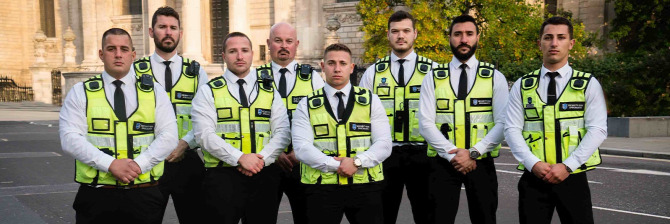Highly Trained Guards
Highly trained guards are security personnel who have undergone extensive training to acquire the skills, knowledge and expertise needed to effectively protect people, property or assets. These guards usually work in roles that require a higher level of security, such as executive protection, high-risk environments or special security operations.
The training of highly qualified guards usually involves a combination of theoretical and practical training. They may receive training in areas such as:

Security protocols and procedures: this includes understanding security systems, access control, emergency response protocols and incident management.
Crowd management and escalation techniques: highly trained guards are equipped to handle large crowds, disperse potentially volatile situations and maintain order in public places.
First aid and resuscitation: guards are often trained in basic first aid and cardiopulmonary resuscitation (CPR) techniques to provide immediate medical assistance in the event of an emergency.
Firearms and weapons training: In certain security roles, guards may receive training in the use of firearms or other special weapons. This training typically includes firearms safety, marksmanship and the legal requirements for their use.
Surveillance and technology: Guards may receive training in the use of security systems, surveillance equipment and other technologies for monitoring and protecting assets.
Communication and customer service: Effective communication and customer service skills are essential for guards to communicate professionally with customers, employees and the public.
Legal and Ethical Considerations: Guards are familiar with laws and regulations related to their security duties, including privacy laws, use of force regulations, and ethical conduct.
Highly skilled guards are often employed in a variety of environments and industries for enhanced security. Here are some examples of where you can find highly trained guards:
Government facilities: Highly trained guards are usually deployed in government buildings, including courts, embassies and military installations. These guards help protect sensitive information, enforce access control measures, and ensure the safety of government officials and employees.
financial institutions and other high-security institutions often employ highly trained guards to protect their assets and to ensure the safety of employees and customers. These guards can monitor surveillance systems, conduct regular patrols and implement security protocols to prevent unauthorised access and potential threats.
Event security. Highly trained security guards are responsible for crowd management, access control and emergency response at these events to maintain order, prevent disturbances and ensure the safety of attendees.
Critical Infrastructure: Facilities that house critical infrastructure, such as power plants, water treatment plants and transport hubs, often require enhanced security measures. Highly trained guards are deployed to protect these sites from potential threats and ensure the continued operation of essential services.
Healthcare facilities: Hospitals, clinics and medical research institutes often require increased security due to the sensitive nature of the services provided. Highly trained guards may be responsible for controlling access to restricted areas, managing disruptive situations
In each of these locations, highly trained guards bring their expertise, knowledge and professional skills to maintain a secure environment. Their presence and proactive approach helps deter and respond effectively to potential threats.


Utolsó kommentek